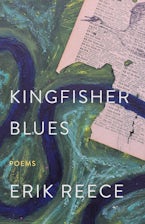A partnership with the Hindman Settlement School.
Fireside Industries strives to publish creative work by authors with unique perspectives, diverse backgrounds, and compelling voices, who are telling the complex stories of Appalachia and rural America. We look for books that are driven by language and characters that can inform, entertain, challenge, and illuminate places and people who are often under-represented in literature.
At Fireside Industries, we want to be a publisher of work that pays homage to the past while also keeping our eyes on the future. Most of Fireside Industries books will be new acquisitions but occasionally we will also re-issue texts that are foundational or deserve a second, and wider, look. The imprint is a collaboration between The University Press of Kentucky and Hindman Settlement School.
Search Results
Kingfisher Blues
Poems
Troublesome Rising
A Thousand-Year Flood in Eastern Kentucky
Daughters of Muscadine
Stories
Even As We Breathe
A Novel
Traces
A Novel
On Troublesome Creek
Stories
Awards, Accolades & Reviews

Winner of the Thomas Wolfe Literary Award
Clapsaddle’s lush debut thrusts 19-year-old Cowney Sequoyah into WWII intrigue…The clear, crisp prose hums consistently as the intricate story easily moves along and new details about Cowney’s family’s past emerge. Both an astonishing addition to WWII and Native American literature, this novel sings on every level.
Publishers Weekly (starred)
Winner of the Weatherford Award for Poetry
As the title suggests, musical performance supplies narrative material in Worthington’s debut; so does Worthington’s female-specific, Appalachian experience. The political sphere is present in flickers, in, say, a grandfather’s xenophobic World War II racism or (in the title poem) violence against women, where the ‘girl singer’ mourns ‘the women killed in all the murder / ballads I knew.’ … Rhetorical questions can often be edited out of poems, but this one provides passage, in celebration and disgust, to contemplating the waste that unites all creatures.
The New York Times
More Press
DROWNED TOWN
Southern Review of Books
Good River Review
Fresh Fiction
Eastern Standard
Midwest Book Review
Today in Nashville
THE GIRL SINGER
The Arkansas International
Chapter 16
Read Poetry Blog
Radical Roots
Transy 1780 Blog
EVEN AS WE BREATHE
Publishers Weekly (starred review)
Foreword Reviews
Bitter Southerner
NPR’s All Things Considered
Appalachian Mountain Books
Town Carolina
WNC Magazine
Southern Literary Review
Southern Review of Books
Goodreads
Mary Whipple Reviews
Robert Gipe Blog
WritersCast
WUNC
Now, Appalachia
Bookin’ Podcast
Shortlisted for Reading Women’s 2020 Fiction Award
Listed on Forbes’s “The Books and Gifts Bookstores Recommend for 2020”
Listed on NPR’s Favorite Books of 2020
Listed on Book Riot’s Best Books of 2020
JUST A FEW MILES SOUTH
Publishers Weekly
Garden & Gun
Food and Wine
Ace Weekly
Lexington Herald-Leader













